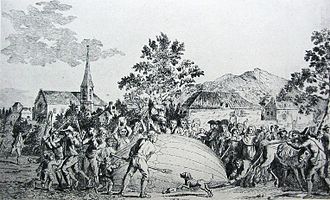Jacques Charles




Jacques Alexandre César Charles (12 November 1746 – 7 April 1823) was a French inventor, scientist, mathematician, and balloonist. Charles is best known for his pioneering work in gas laws and ballooning, and his name is commemorated in the Charles's law, which describes how gases tend to expand when heated. His contributions to science and aeronautics have made him a notable figure in the history of physics and aviation.
Early Life[edit]
Jacques Charles was born in Beaugency, France, and received his education in Paris. Initially, he pursued a career in finance but his interest in science led him to experiment with electricity and other areas of physics.
Contributions to Science[edit]
Charles's Law[edit]
Charles's most significant scientific contribution was the formulation of what is now known as Charles's law. In 1787, he discovered that at constant pressure, the volume of a gas increases or decreases by the same factor as its temperature increases or decreases. This principle is fundamental to understanding the behavior of gases and has numerous applications in various scientific fields, including chemistry, meteorology, and engineering.
Aeronautics[edit]
Charles also made significant contributions to the field of aeronautics. On 27 August 1783, he launched the world's first unmanned hydrogen balloon. The success of this experiment demonstrated the potential of hydrogen over hot air for balloon flight. Later, on 1 December 1783, Charles and his co-pilot, Nicolas-Louis Robert, made the first manned gas balloon flight in a hydrogen-filled balloon. This flight, which started from the Jardin des Tuileries in Paris, covered a distance of about 36 kilometers and lasted for 2 hours, marking a milestone in human flight.
Legacy[edit]
Jacques Charles's work laid the groundwork for future developments in both thermodynamics and aeronautics. His experiments with hydrogen balloons opened the door to the use of balloons for weather observation, military reconnaissance, and eventually, passenger travel. Charles's law remains a fundamental concept in chemistry and physics curricula around the world.
Charles's contributions to science and his pioneering spirit in aeronautics have been recognized by having his name attached to the law he discovered, as well as by the numerous monuments and memorials dedicated to him in France. His work continues to inspire scientists, engineers, and aviators.
Death[edit]
Jacques Alexandre César Charles passed away on 7 April 1823 in Paris. His legacy lives on through his contributions to science and the field of aeronautics.
Ad. Transform your life with W8MD's Budget GLP-1 injections from $75


W8MD offers a medical weight loss program to lose weight in Philadelphia. Our physician-supervised medical weight loss provides:
- Weight loss injections in NYC (generic and brand names):
- Zepbound / Mounjaro, Wegovy / Ozempic, Saxenda
- Most insurances accepted or discounted self-pay rates. We will obtain insurance prior authorizations if needed.
- Generic GLP1 weight loss injections from $75 for the starting dose.
- Also offer prescription weight loss medications including Phentermine, Qsymia, Diethylpropion, Contrave etc.
NYC weight loss doctor appointmentsNYC weight loss doctor appointments
Start your NYC weight loss journey today at our NYC medical weight loss and Philadelphia medical weight loss clinics.
- Call 718-946-5500 to lose weight in NYC or for medical weight loss in Philadelphia 215-676-2334.
- Tags:NYC medical weight loss, Philadelphia lose weight Zepbound NYC, Budget GLP1 weight loss injections, Wegovy Philadelphia, Wegovy NYC, Philadelphia medical weight loss, Brookly weight loss and Wegovy NYC
|
WikiMD's Wellness Encyclopedia |
| Let Food Be Thy Medicine Medicine Thy Food - Hippocrates |
Medical Disclaimer: WikiMD is not a substitute for professional medical advice. The information on WikiMD is provided as an information resource only, may be incorrect, outdated or misleading, and is not to be used or relied on for any diagnostic or treatment purposes. Please consult your health care provider before making any healthcare decisions or for guidance about a specific medical condition. WikiMD expressly disclaims responsibility, and shall have no liability, for any damages, loss, injury, or liability whatsoever suffered as a result of your reliance on the information contained in this site. By visiting this site you agree to the foregoing terms and conditions, which may from time to time be changed or supplemented by WikiMD. If you do not agree to the foregoing terms and conditions, you should not enter or use this site. See full disclaimer.
Credits:Most images are courtesy of Wikimedia commons, and templates, categories Wikipedia, licensed under CC BY SA or similar.
Translate this page: - East Asian
中文,
日本,
한국어,
South Asian
हिन्दी,
தமிழ்,
తెలుగు,
Urdu,
ಕನ್ನಡ,
Southeast Asian
Indonesian,
Vietnamese,
Thai,
မြန်မာဘာသာ,
বাংলা
European
español,
Deutsch,
français,
Greek,
português do Brasil,
polski,
română,
русский,
Nederlands,
norsk,
svenska,
suomi,
Italian
Middle Eastern & African
عربى,
Turkish,
Persian,
Hebrew,
Afrikaans,
isiZulu,
Kiswahili,
Other
Bulgarian,
Hungarian,
Czech,
Swedish,
മലയാളം,
मराठी,
ਪੰਜਾਬੀ,
ગુજરાતી,
Portuguese,
Ukrainian
